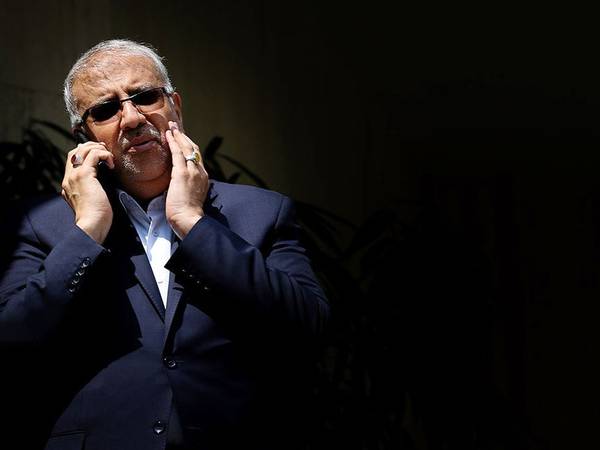Iranians seem not to believe government assurances that it currently has no plans to raise gasoline prices, while some officials hint at a possible timeframe.
Iran’s Oil Minister Javad Owji and government spokesman Ali Bahadori Jahromi reiterated in the past two days that the administration would not increase gasoline prices, but oddly claiming that the long lines of cars at gas stations and the consequent black market are only the result of measures to decrease consumption.
Owji said that foreign-based Persian media are behind the rumors of an impending hike, but the government only plans to reduce consumption by restricting fill-ups at gas stations, claiming that “all refineries are operating at full capacity, with 150 million liters of fuel reserves available.”
But actually 150 million liters is a little over one day’s consumption, which means a critical shortage of supplies.
"Last week, we consumed 137 million liters per day, and today we have a consumption of 114 million liters, and nothing unusual has happened in the country," he explained. A source at the oil ministry told Iran International earlier in August that the National Iranian Oil Refining and Distribution Company (NIORDC), a department within the ministry, has released around 900 million liters of strategic gasoline reserves into the market.
Many Iranians, however, are of the opinion that the regime is only delaying a price hike in fear of triggering protests ahead of last year's protest anniversary in September. Iran International reported in late July that the government has postponed tighter fuel rationing implementation due to the same reason.
Iran has been struggling with gasoline shortages since at least mid-2022 and was forced to release one-third of its strategic reserves by the end of the year. The government, which controls one of the world's largest oil and gas reserves in the world, sells gasoline at extremely low, subsidized prices, charging less than 10 US cents per gallon, or less than 3 cents per liter, while neighboring oil-producers have much higher prices, more in line with international market rates. Second only to Venezuela, Iran has the world’s cheapest gasoline price.
For years there has been talk of adjusting prices, but since 2018 Iran’s currency has dropped 12-fold and any increase needs to be huge to be meaningful in US dollars. One of the main reasons that the Islamic Republic has not managed to increase prices amid the current economic crisis is because it faced the worst wave of unrest in years from September 2022 to February 2023.
In November 2019, a government decision to increase fuel prices by 50–200 percent triggered nationwide unrest that lasted for two weeks. Regime forces killed at least 1,500 civilians, in the worst such crackdown in Iran. Iranians are concerned about a repeat of the bitter experience.
Lawmaker Jalal Rashidi Kochi said Tuesday that "People distrust officials and their words. If we touch the gasoline prices, people will take to the streets and protest…Our approach to gasoline was flawed from scratch. It means we are doing something fundamentally wrong, and the more we try to do it right, the worse it gets."
Reformist politician Morteza Moballegh told Hamdeli newspaper that the government is the main loser in the gasoline market because the congestion at the gas stations is proof that people do not trust the government despite their repeated claims of no change in prices. "The distrust is due to fundamental policies... These gentlemen (the current administration) are trying to impose some of their mindsets, which are not in line with the needs of today's Iran and the law, on the people. This situation provokes a reaction from society and has created serious problems for the people."
In the meantime, lawmaker Mohsen Zanganeh, the spokesperson for the budget committee at the parliament, said a rise in prices is not proposed in the budget for this year, meaning that “any possible increase will take effect from the beginning of the Iranian year 1403 (in March 2024).”
“However, the government has included the possibility in the budget that it can achieve energy savings through pricing and non-pricing policies," he emphasized. “Certainly, if the government intends to take such a measure (increase gasoline prices), the parliament will not allow it to happen without prior notice."
Ali Naderi, the CEO of the government’s official news agency IRNA, said earlier in the week that the non-transparent action regarding gasoline prices that took place in 2019 should not happen again, noting that it should be explained to people that “gasoline prices are not expected to remain fixed for the next 10 years.”
"Why do people accept that the price of bottled water reaches its real cost? For gasoline, too, this matter should be accepted, and it should be transparently explained to the people whether an increase in gasoline prices is planned or not,” he added.
Minds are set on a fuel price closer to international rates but there are also opinions fundamentally different, pointing out that the regime is not actually providing cheap fuel for the nation because it gains a huge profit in the prices and taxes on automobiles.
Jomhouri-e Eslami conservative newspaper said on Wednesday, "The people of Iran are paying for gasoline at the same global prices" as they paid a couple of times more than the real price for their cars compared with car prices worldwide. “Calculate the price of the cars you sell to the people as well. Then you will see that you don't offer a cheaper deal to the people of oil-rich Iran,” argued the paper addressing the government that controls the inefficient auto industry making old-model and inferior cars for very high prices.
The paper claimed that if the decision is put to a referendum, people will vote to buy both cars and gasoline at international prices.
